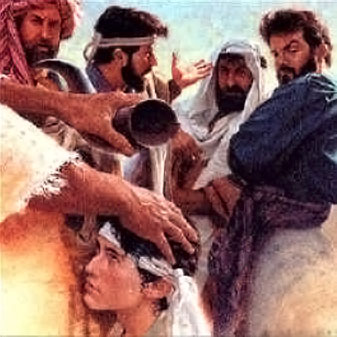A King Among Sons
 Check out the matrix pattern in 1 Samuel 16. It’s an easy one, but it’s so beautiful. And it makes sense of the (rare) physical description of David, related to the Holy Place. Each of the seven sections follows the matrix, but here is the overall pattern:
Check out the matrix pattern in 1 Samuel 16. It’s an easy one, but it’s so beautiful. And it makes sense of the (rare) physical description of David, related to the Holy Place. Each of the seven sections follows the matrix, but here is the overall pattern:
T R A N S C E N D E N C E
Creation : Day 1 – Spirit/Ark – Genesis
The Lord commands Samuel to fill his horn with oil
H I E R A R C H Y
Division : Day 2 – Firmament/Veil – Exodus
The Lord sends Samuel under the pretense of making a sacrifice.
E T H I C S – 1
Ascension : Day 3 – Land & Sea – Grain & Fruit/Altar & Table – Leviticus
Samuel obeys and travels to Bayith-Lechem (House of Bread). He commands Jesse and his sons to consecrate themselves. The first son is presented as the “Head,” the firstfruits, but is rejected.
E T H I C S – 2
Testing : Day 4 – Ruling Lights/Lampstand – Numbers
Jesse’s seven sons pass before Samuel. The Lord rejects them all.
E T H I C S – 3
Maturity : Day 5 – Swarms/Incense – Deuteronomy
Jesse reveals that there is an eighth Son, David (“Beloved”), who is keeping the flocks, the “Body.” Samuel commands him to bring him in, or there will be no rest.
S A N C T I O N S
Conquest : Day 6 – Mediators/High Priest – Joshua
David has bright eyes, (literally) a blood-filled face, and is attractive. He is the Facebread (Ethics 1) and the Lampstand (Ethics 2), and the Incense (Ethics 3). The wilderness has made him into a Holy Place.
S U C C E S S I O N
Glorification : Day 7 – Rest/Shekinah – Judges
Samuel takes the horn of oil and anoints David. The Spirit rests upon the Beloved from that day on.
A few notes:
- Read the passage for yourself and see it you can see the 7-fold structure of each of the seven sections.
- Both Samuel and John the Baptist were Nazirites from birth. In a greater sense, all the “sons of David” passed before John as he was baptizing in the Jordan. All were rejected until Jesus presented Himself “to fulfill all righteousness.” The Spirit descended, and the Father said, “This is my beloved Son, with whom I am well pleased.”
- Perhaps this is the background to the phrase in Ephesians 1:6, “accepted in the Beloved.” Israel could not truly cross the Jordan, could not truly “enter into rest” until her Captain arrived.
- Read Peter Leithart’s A Son to Me: An Exposition of 1 and 2 Samuel, for some background on Samuel as Saul and David’s “father.”
- Notice that the next passage concerns a spirit coming upon Saul. These two “sons” become two atonement “goats.”


























March 10th, 2012 at 12:29 am
Some comments from a discussion of this post on the BH forum, for what it’s worth.
Justin Donathan asked how Judges is connected to rest/shekinah.
“It seems as if there is very little rest or glory in Judges. There are flashes of it, but then things always get fouled up. It seems that the overall motif is that everyone did whatever they wanted and so they never had any lasting rest. Obviously this is always true until Jesus comes, but in terms of the theme or motif of the book I wouldn’t have thought rest/sabbath/shekinah for Judges. After all, I Samuel starts out where Judges leaves off and it’s not a very pretty picture.”
James Jordan says that as soon as Adam/Israel/Solomon gets the Garden he squanders it.
Also, the matrix pattern begins with an individual mediator (external law – Moses) and ends with a corporate mediator. It begins with Elohim and ends with elohim (“ye are gods”), a people of internal law, self-governing, self legislating. This is where Israel failed. They were too immature to serve an unseen king. And Justin is right, it wasn’t until Christ that Moses’ wish for “all the Lord’s people” to be prophets (internal Law) was fulfilled.
Samuel is a new beginning, a boy dressed in linen, sleeping in the Most Holy.
“Well, I don’t think he was sleeping in the Most Holy place, just the tabernacle precincts “where the ark was.” He wouldn’t have been allowed in the MHP, being just a levite and not even a priest, much less high priest. And even if he were, no one ever slept in there… I admit the language can be read that way, but after listening to JBJ’s lectures and reading Leithart on the passage, I’m pretty well convinced that he couldn’t have literally been sleeping in the MHP.”
I can believe that, for sure. But David ate the facebread. The Lord seems to overlook the rules and grant unlikely access to chosen sons. Perhaps the text is deliberately ambiguous.
March 10th, 2012 at 12:40 am
Another thought. The structure here implies that Moses’ official reason to Pharaoh for taking Israel into the wilderness (to worship) was an “Evian” deception, like the lies of the midwives. And it also makes Saul out to be a new Pharaoh.